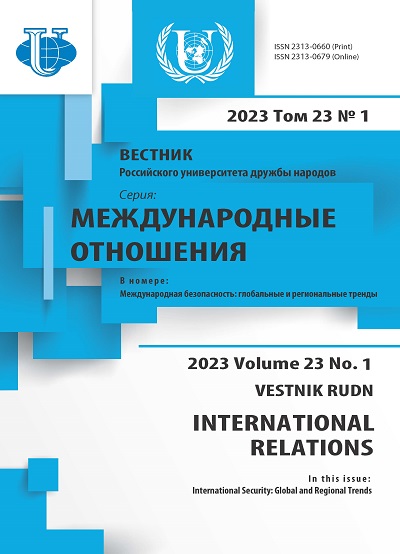African Continental Integration - A New Step towards a Multipolar World
- 作者: Volkov S.N.1, Konstantinova O.V.1
-
隶属关系:
- Institute for African Studies, Russian Academy of Sciences
- 期: 卷 23, 编号 1 (2023): International Security: Global and Regional Trends
- 页面: 157-167
- 栏目: 国际经济关系
- URL: https://journals.rudn.ru/international-relations/article/view/34198
- DOI: https://doi.org/10.22363/2313-0660-2023-23-1-157-167
- EDN: https://elibrary.ru/THCCVS
如何引用文章
详细
The global economy continues to suffer the consequences of the 2020 global recession caused by the COVID-19 pandemic and the dramatic shifts in international relations in 2022 triggered by severe sanctions imposed by Western nations against Russia. Many countries have been affected by the restrictions. African economies were no exception, experiencing a strong negative impact of these sanctions because of rising global prices on cereal crops, oil, natural gas, and mineral fertilizers, which caused a decrease in their imports felt primarily by the most vulnerable population groups. In addition, the region has seen a retreat from basic gains in living standards and social problems. This situation has once again made it clear to African countries that they should pool efforts in order to minimize damage and facilitate economic recovery. In this regard, the issues of developing economic integration, such as the transition from the subregional to regional (continental) level of economic integration, which is the subject of this paper, have become more relevant. The African Continental Free Trade Area, launched on January 1, 2021, is the largest in the world in terms of the number of participating countries with a total population of 1.3 billion USD and GDP of 3.4 trillion USD, and is expected to more than double by 2050. An important achievement of economic integration in Africa is the creation in 2018 of the African Single Market for Air Transport and plans for the introduction of a single passport, which are designed to ensure the free movement of Africans across the continent. Thus, continental integration is an extremely important and necessary tool for Africa to strengthen intra-regional ties, increase labor productivity and enhance the competitiveness of African goods. In addition, the promotion of integration helps to strengthen Africa’s economic and political positions in the world, which objectively contributes to the movement towards a multipolar world.
作者简介
Sergey Volkov
Institute for African Studies, Russian Academy of Sciences
编辑信件的主要联系方式.
Email: snvolkov@list.ru
ORCID iD: 0000-0002-6152-1091
PhD (Economiсs), Head, Centre for the Study of the Russian-African Relations and African States’ Foreign Policy
Moscow, Russian FederationOlga Konstantinova
Institute for African Studies, Russian Academy of Sciences
Email: ryabina111@ya.ru
ORCID iD: 0000-0002-3163-4925
PhD (Economiсs), Research Fellow, Centre for the Study of the Russian-African Relations and African States’ Foreign Policy
Moscow, Russian Federation参考
- Abramova, I. O., & Fituni, L. L. (2018). The African segment of multipolar world: Dynamics of geostrategic significancy. World Economy and International Relations, 62(12), 5-14. (In Russian). https://doi.org/10.20542/0131-2227-2018-62-12-5-14
- Byiers, B., & Miyandazi, L. (2021). Balancing power and consensus: Opportunities and challenges for increased African integration. Istituto Affari Internazionali Papers, (09), 1-33. Retrieved from https://www.iai.it/sites/default/files/iaip2109.pdf
- Drobot, E. V., & Sapuntsov, A. L. (2021). African Continental Free Trade Area in “reflections” of international economic integration: Quo Vadis? Ekonomicheskie Otnosheniya, 11(2), 355-376. (In Russian). https://doi.org/10.18334/eo.11.2.112139
- Fituni, L. L. (2019). Towards a neo-bipolar model of the world order: Scouting game in Africa. Outlines of Global Transformations: Politics, Economics, Law, 12(3), 6-29. (In Russian). https://doi.org/10.23932/2542-0240-2019-12-3-6-29
- Fituni, L. L., & Abramova, I. O. (2020). Developing countries in the political economy of the post-coronavirus world. World Economy and International Relations, 64(9), 5-14. (In Russian). https://doi.org/10.20542/0131-2227-2020-64-9-5-14
- Gammadigbe, V. (2021). Is regional trade integration a growth and convergence engine in Africa? IMF Working Paper, (19), 1-39. Retrieved from https://www.imf.org/en/Publications/WP/Issues/2021/01/29/Is-Regional-Trade-Integration-a-Growth-and-Convergence-Engine-in-Africa-50040
- Gottschalk, K. (2020). African peacekeeping and African integration: Current challenges. Vestnik RUDN. International Relations, 20(4), 678-686. https://doi.org/10.22363/2313-0660-2020-20-4-678-686
- Hamouda, S. (2021). South - South and triangular cooperation in the face of COVID-19: A quest for resilience in Africa. Institute for Global Dialogue Occasional Paper, (85), 1-21. Retrieved from https://www.africaportal.org/publications/aprm-working-paper-south-south-and-triangular-cooperation-face-covid-19-quest-resilience-africa/
- Hirsch, A. (2021). A strategic consideration of the African Union Free Movement of Persons Protocol and other initiatives towards the freer movement of people in Africa. South African Institute of International Affairs Working Paper, 1-27. Retrieved from https://saiia.org.za/wp-content/uploads/2021/01/WP_A-Hirsch_Regularising-migration-in-Africa_20210122-002.pdf
- Konstantinova, O. V. (2020). Integration processes on the African continent. In S. N. Volkov, T. L. Deych & S. V. Nenashev (Eds.), Africa in the conditions of the formation of a polycentric world (pp. 282-288). Moscow: Institut Afriki RAN publ. (In Russian).
- Kostyunina, G. M. (2020a). Directions of formation and potential effect of African continental free zone trade. Russian Foreign Economic Journal, (4), 33-47. (In Russian).
- Kostyunina, G. M. (2020b). Regionalism in the modern world economy: Evolution and main trends. Vestnik RUDN. International Relations, 20(2), 303-317. (In Russian). https://doi.org/10.22363/2313-0660-2020-20-2-303-317
- Ledeneva, M. V., & Plaksunova, T. A. (2020). Economic growth and prospects for economic development of African countries southward Sahara. Theoretical and Applied Economics, (2), 129-139. (In Russian). https://doi.org/10.25136/2409-8647.2020.2.32732
- Morozenskaya, E. V. (2019). “New regionalism” in Africa: Form of the adaptation to globalization or the attempt of opposition to modern neocolonialism? Outlines of Global Transformations: Politics, Economics, Law, 12(4), 209-227. (In Russian). https://doi.org/10.23932/2542-0240-2019-12-4-209-227
- Shipalana, P., & O’Riordan, A. (2020). Impact of Covid-19 on financial stability in Africa. South African Institute of International Affairs Occasional Paper, (311), 1-33. Retrieved from https://saiia.org.za/wp-content/uploads/2020/11/Occasional-Paper-311-oriordan-shipalana.pdf
- Volkov, S. N., & Deych, T. L. (2020). Africa in the emerging model of the world order. Asia and Africa Today, (7), 73-77. (In Russian). https://doi.org/10.31857/S032150750010106-8
- Volkov, S. N., & Deych, T. L. (2021). The BRICS role in overcoming the COVID-19 crisis in Africa. Vostok (Oriens), (3), 204-215. (In Russian). https://doi.org/10.31857/S086919080014841-2
- World Bank. (2020). The African Continental Free Trade Area: Economic and distributional effects. Washington, D.C.: World Bank.
补充文件
没有额外的文件显示








